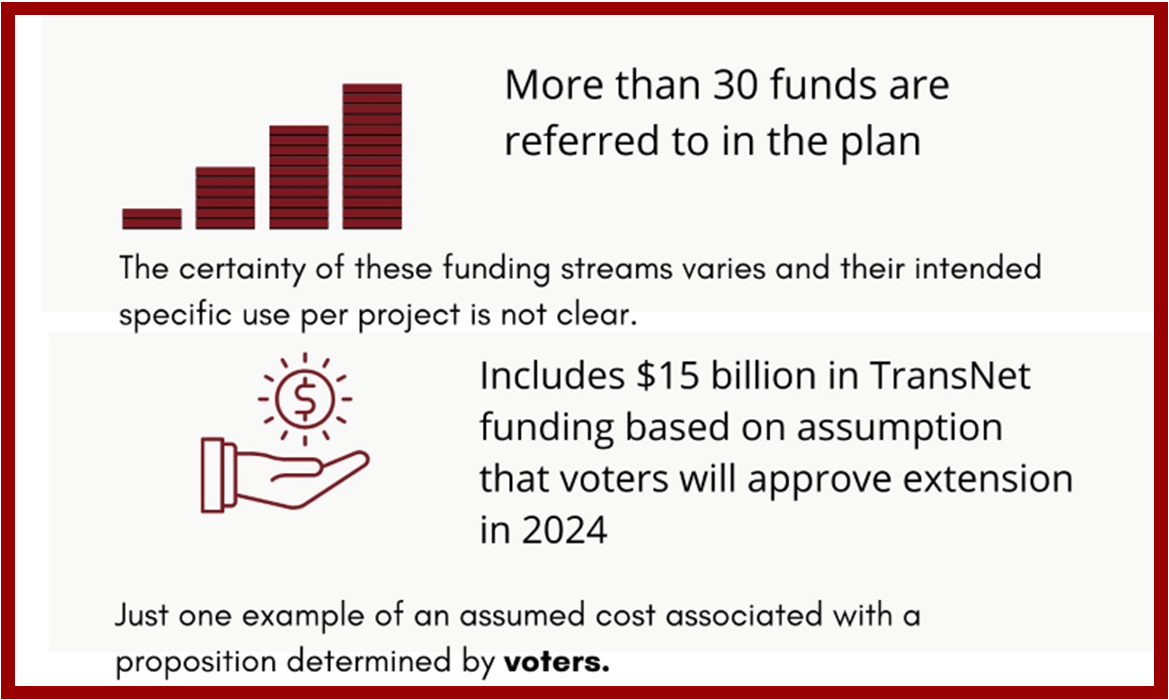Taxpayers Educational Foundation Peer Review Finds SANDAG RTP Rational but Risky SANDAG RTP Data and Assumptions Generally Sound, But Significant Risks in Future Finance
5 Minute Read
In December 2021, The San Diego Association of Governments’ (SANDAG’s) 2021 Regional Transportation Plan (RTP) was passed by the SANDAG Board as an update of the broad 40 year plan published in October 2011 outlining the vision through 2050. The RTP requires $163 billion through 2050 to reshape San Diego’s transportation system. As such, between now and 2024, San Diego voters will see numerous proposals and ballot measures come before them proposing taxes and fees to support this extensive transportation infrastructure plan. We thought it was important to assess the data, methods and assumptions SANDAG used to complete the 2021 RTP so that San Diego County taxpayers know what they can trust to make their own informed decisions on tax or fee proposals related to the RTP.
“If you’re like most residents in our region juggling a full plate of work and family responsibilities and don’t have the time to go to SANDAG meetings or wade through tens of thousands of pages, we want to help you get the information you need,” said Haney Hong, president and trustee of the Foundation. “Before you decide to vote on any future tax or fee to pay for this plan, you want to know what’s in the plan. You might be asking: how did they tackle teleworking? Did they get information from people who speak in my language? What do they assume about jobs and inflation?”
There are over 30 funds referred to in the plan, but the certainty of these funding streams varies and their intended specific use per project is not clear. There is no way for the voters to know which funds will be used to cover which projects, or what projects are removed or reduced if funding is insufficient to cover the full plan. The lack of an itemized expenditure plan that ties revenues to projects and the lack of prioritization are significant concerns. A voter cannot make an informed choice based on the information provided thus far
It is also important to consider that each of these taxes or fees has the potential to be progressive or regressive depending on the specific manner in which it is applied. Generally, the more blunt or simple the application, the more regressive they are likely to be – meaning the bulk of the costs fall on the lowest income earners. That said, the more complicated the system, often the more time, money, and monitoring it takes to successfully implement and maintain.
The bottom line is, as a region, we are not going anywhere if we go it alone. Local governments comprising the region have banded together to coordinate and collaborate, officially under the management of SANDAG. This collaboration brings advantages and disadvantages, complex challenges and complex benefits. As a result, we cannot move forward assessing an entire plan or individual components of a plan solely on the merits of what is important from our individual or specific community perspective.
For the most part, SANDAG’s methods are sound, their data is largely well-founded, but their assumptions related to funding are concerning. The San Diego region should not be surprised in future years to see a repeat of what we see today, where different communities in the region were unaware of the risks accepted years ago and then express disappointment that projects in their neighborhood did not come to fruition. We encourage readers to visit these concepts in greater detail in the full report.
The San Diego Taxpayers Educational Foundation supports the San Diego County Taxpayers Association and the general taxpaying public with in-depth research and educational programming for community leaders and civil servants. The Foundation convenes the regional community of public policy practitioners, educators, and artists who want to study issues objectively and to facilitate civility and citizenship in public policy discussions. The Foundation also administers the new Public Regional Outcomes Standards Board (PROS Board), which sets generally-accepted rules and methods for our region in reporting public good outcomes.



